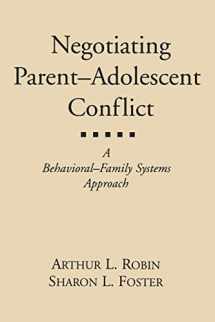
Negotiating Parent-Adolescent Conflict: A Behavioral-Family Systems Approach
Book details
Summary
Description
Parent-adolescent discord is often handled from a unitary perspective, whether the focus is on enhancing parenting skills, resolving conflicts in family relationships, or working to improve the behavior of the individual child. This important work shows the clinician how to incorporate all of these crucial elements into a single, research-based treatment program. Presented is the authors' influential integration of cognitive-behavioral constructs and family systems theory, grounded in consideration of adolescent developmental concerns. The book describes effective ways to conceptualize and assess the problems of embattled parents and teens; use assessment data in treatment planning; overcome resistance and other therapeutic hurdles; and implement carefully sequenced skills training, cognitive restructuring, and functional/structural interventions. The theoretical and empirical bases of the treatment approach are also discussed in depth.


We would LOVE it if you could help us and other readers by reviewing the book
Book review



